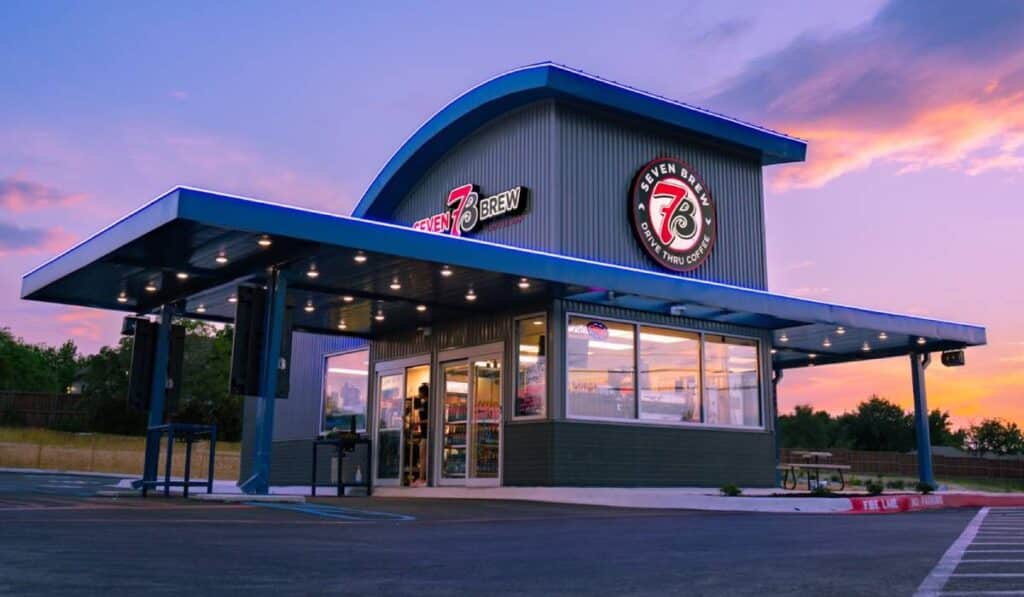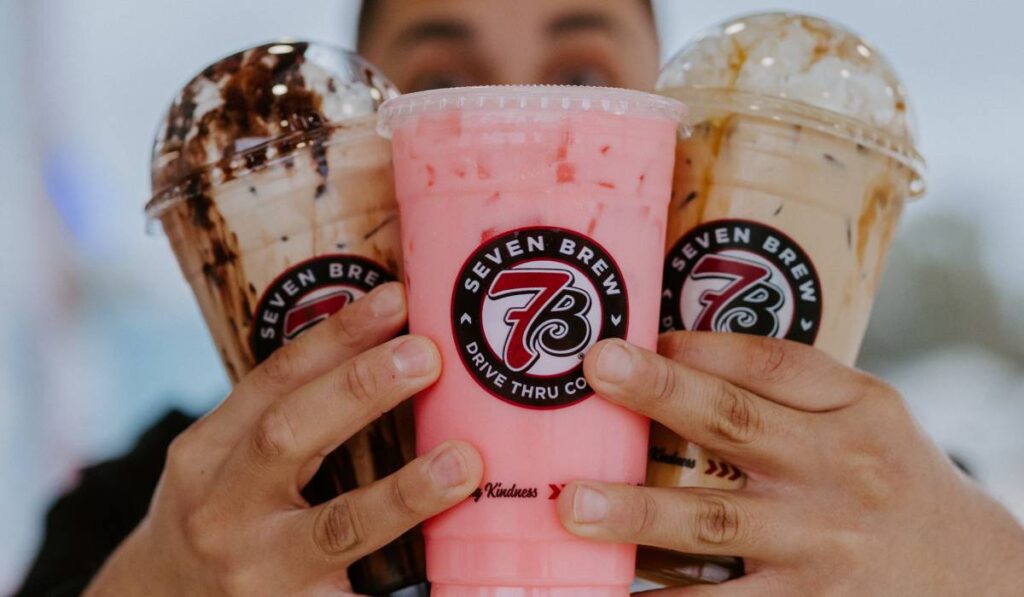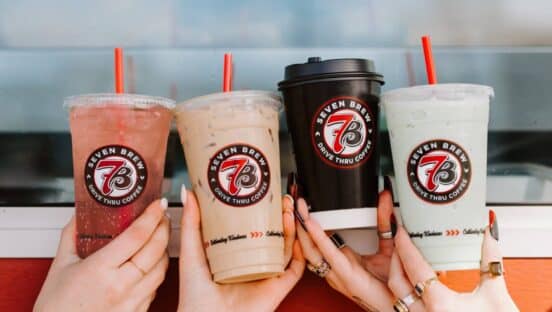The simplicity of 7 Brew starts with its name.
When the brand was founded in 2017 in Rogers, Arkansas—also known as the home of the first Walmart—it debuted with seven choices. Those were Blondie (caramel and vanilla breve), Brunette (hazelnut and caramel mocha), Smooth 7 (white chocolate and Irish cream breve), Cinnamon Roll, White Chocolate Mocha, German Chocolate, and Triple 7 (Smooth 7, but with six espresso shots).
Six years later, the chain’s offerings have ballooned to 20,000-plus combinations, including the most recent addition of cold brew. But at its core, the simple model remains. 7 Brew—named QSR’s 2023 Breakout Brand of the Year—is “drive-thru only and drinks only” CFO Nicole Miller Regan explains. The executive chooses her description carefully because she wants others to know the company isn’t just about coffee. There are chillers, teas, infused energy, sodas, and more.
“It’s delivering energy to people all day long and then hospitality,” Miller Regan says. “Being kind is always in style. Always.”
Franchisees bought into the philosophy. The chain grew to 40 locations by the end of 2022 and had 150 stands in 24 states as of late October. That means 7 Brew’s unit size skyrocketed by 275 percent in less than a year. Of those shops, roughly 90 percent are operated by 45 franchisees.
The long-term goal is to stretch coast to coast, and 7 Brew has the pipeline to do that and more. The company’s FDD states there were 2,000 store commitments as of December 2022. CEO John Davidson has said publicly that it’s since increased to more than 2,500 and is on track for 3,000. This year’s objective has been to solidify the Southern, Midwest, and Northeast regions of the U.S.
LOOK BACK: QSR’s Breakout Brand of 2022: The Sizzling Rise of Dave’s Hot Chicken
“How do you go from 40 to 150? We need franchise partners. That’s why we’re going so fast and breaking records,” Miller Regan says. “And then operationally there are physical attributes. I mean, it’s a two-lane drive-thru the whole way through without any friction of a zipper. It is a glass building that lights up with a blue light at night. This is gorgeous. It feels good to work inside. It’s not a closed structure. We customize like everyone. We’re fast like everyone. We’re accurate like everyone.”

Swift Sips
7 Brew’s website instructs visitors to “Forget everything you know about working at ‘cafes’ or ‘coffee drive-thrus.’ We’ve started a revolution to bring the fun back.”
True to this point, the growth story is quite the outlier, not only in the beverage space but the quick-service segment overall.
The brand’s current trajectory began in January 2020 when it was acquired by Brew Culture, a parent company formed by Davidson and a group of entrepreneurs. At the time, there were seven shops. A year later, the brand initiated its franchise program and back-to-back record development years followed in 2022 and 2023. The company crossed the 100-unit mark in June thanks to openings in Auburn, Alabama; San Antonio; Springdale, Arkansas; and Traverse City, Michigan.
The success was enough to place 7 Brew on QSR’s Best Franchise Deals in September.
The chain’s massive rise is fueled by serious multi-brand operators who are signing on for 50-60 shops on average. Notable franchisees include Tacala Companies and K-Mac Enterprises, which both oversee Taco Bell restaurants. There’s also Meritage Hospitality Group, a franchisee of more than 380 Wendy’s units in 16 states. It announced in August that its board approved to proceed as a 7 Brew franchisee in the Midwest. The preliminary agreement calls for up to 64 restaurants by the end of 2030. Another operator, Brew Crew LLC, owned by business partners Larry Wilson and Brandon Sebald, said last year that they want to open more than 200 locations across the U.S.
Each box—built offsite and then dropped onto a slice of real estate—features canopied double drive-thrus. According to the FDD, typical 7 Brew stores require a lot ranging from 8,000 to 50,000 square feet on which a roughly 500-square-foot modular building will be placed. Units are usually on an out-parcel to a shopping center with highway exposure or proximity. The total investment necessary to begin operating is approximately $900,000 to $1.9 million.
Although a small sample size, 7 Brew’s FDD shows that 14 measured locations (13 company-owned units and one franchise) earned more than $2.3 million in average gross sales in 2022, with the highest-performing outlet exceeding $3.1 million. The documents show no closures between 2020 and 2022.
“There’s a financial return robustness, no doubt, but people want to be a part of excitement, energy, and a movement,” Miller Regan says. “I think that’s what happens at the stand level every single day. And that’s what our franchisees have been attracted to and joining us in partnership to grow this business.”
However, Miller Regan wants to make one thing clear: 7 Brew didn’t rise from 40 to 150 shops in less than a year without any obstacles. That couldn’t be further from the truth. The reality is that much diligence is required. There’s a stage gate process, from pulling permits and getting a design and construction team involved to finally dropping the building. From then, it takes roughly 30 to 60 days to open.
Even during that seemingly mundane timeline, 7 Brew prioritizes excitement. The company allows the community to watch as the structure is put into place via crane. Once the grand opening rolls around, the chain moves quickly to establish a cult-like following. With every store debut comes Swag Day, a time when customers can get free swag with the purchase of a large drink.
“We want to go as fast as possible, but I think the modular building aspect is pretty cool because it’s something that you can see in the community and draws attention to the brand but it’s also really fast. Then there’s definitely plenty of stuff that takes a lot of time,” Miller Regan says. “Ordering certain things through the supply chain and the permitting process—none of that has gotten any easier. We just make sure we plan for that accordingly.”

Pouring Culture
7 Brew’s growth is supported by an experienced leadership team.
Miller Regan joined in December 2022 after serving as the managing director and head of the consumer equity research practice at investment bank Piper Sandler. COO and director of franchising Drew Ritger came on board in June 2021 after previously working as CEO of Zips Dry Cleaners and spending 22 years at Sonic. Director of training CeCe LaBorde is homegrown. She worked at the store level for three years before assuming her current role.
The group views itself as franchisees’ No. 1 support system. Every operator starts by visiting the Northwest Arkansas headquarters for a two-day orientation. The franchisees, who bring along a certain number of employees with them, tour a nearby store and physically learn how to work all the stations. As of late October, there were 28 training weekends in 2023. 7 Brew’s corporate team never tells employees beforehand that a franchisee is coming because it wants workers to be authentic.
“I’ve seen it 45 times walking in and out of the stand,” LaBorde says. “Everybody has the same reaction. They’re blown away five minutes into it. You see the line, you see the excitement, you see the culture. You also see Sally Q taking a dub shot with one of her regulars every day. You see the connections people are making on a day-to-day basis. You see, ‘Oh, I went to their wedding last week. They’ve been my regular for two years.’ That goes a really long way, especially in today’s world where people are starting to work remotely.”
Per the FDD, there’s also a 14-day training program for store management and above and a three-day training program for hourly employees. Each beverage stand is required to have two fully-trained managers onsite.
Within these sessions, leaders focus on the usual suspects—speed, quality, and customer service. If someone isn’t meeting those expectations, Miller Regan, Davidson, or LaBorde will facilitate a conversation to identify pain points and where improvements can be made. It’s the corporate team’s mission to “not let them fail operationally throughout the entire opening game plan,” LaBorde says. She adds that “over-communication is a big part of what we do here.” Field workers are assigned to regions and franchisees to provide extra assistance.
“I can’t teach you how to be a team player, speed, quality, customer service,” LaBorde says. “Those are things that truly are embodied by the brand and the team. Whenever you walk into a stand, you feel that energy. It’s fun. You want to be there. But I think that some of those things are just not tangible to where you can read it and learn it. There’s a lot of training in place to make sure that they’re successful along the way.”
Arguably, the most significant lesson taught by 7 Brew is about human interaction. Instead of customers pulling up to a speaker box, employees greet cars and take orders. These workers have an iPad in their hands but are required to make friendly eye contact with guests and drum up routine conversations.
The whole 7 Brew experience, start to finish, is focused on eliminating tension, Miller Regan says.
“This customer is going to spend a few minutes today with us, but we’re going to make their day and that’s exactly what we’re aiming to do,” she says. “We want to relieve any tension points, any friction points. Speaking to a human versus the side of the building is phenomenal in that regard. In a lot of ways, both our physical attributes and the human attributes make it really simple, really fun, really easy to get people on their way. You have to be fast, you have to be accurate. But we’re also going to spend a little bit of time with you. A couple of minutes at a time can go a long, long way.”
What’s Brewing?
Miller Regan doesn’t have a precise number for what development will look like in 2024, but the hopes are that it will be “just as awesome as this year was” and that 7 Brew will continue to break records.
For context, the chain forecasted 193 openings for 2023 in its FDD. That includes 36 in Texas, 16 in Florida, 13 in Oklahoma, 12 in Tennessee, and 10 each in Arkansas, Georgia, Indiana, and Kansas.
In October, there were 17 corporately owned units, which represents a net gain of one compared to the previous year. The shops are a vehicle for everything the company wants to test and upgrade in terms of operational excellence and menu innovation.
Nearly every future new store will be owned by a franchisee. And 7 Brew is keen on giving them the proper tools to grow positively.
“I think that whenever it comes to training, we always do shoulder to shoulder,” LaBorde says. “We’re really big on culture, we’re really big on making everybody feel supported. People really want to work with us. We don’t call people employees. They’re teammates. We work one-on-one with our franchisees, and we wouldn’t be anywhere without them. I think really pouring into them and really having them embody the culture is huge. People physically coming to Northwest Arkansas for a new market to really understand the brand and the culture. It’s something that we really dive in and teach the new baristas and the franchisees.”
Miller Regan agrees. If the beverage chain is to continue its rapid pace—but in a sustainable manner—the right multi-unit operators must be in place.
“That means understanding real estate, understanding development, understanding operations, and having the financial capital to make these commitments,” Miller Regan says. “And then of course, first and foremost, laying on top—day in and day out—the culture. That’s what we’re looking for. We go into these stands and make sure that we’ve transferred the energy, transferred the culture.”








